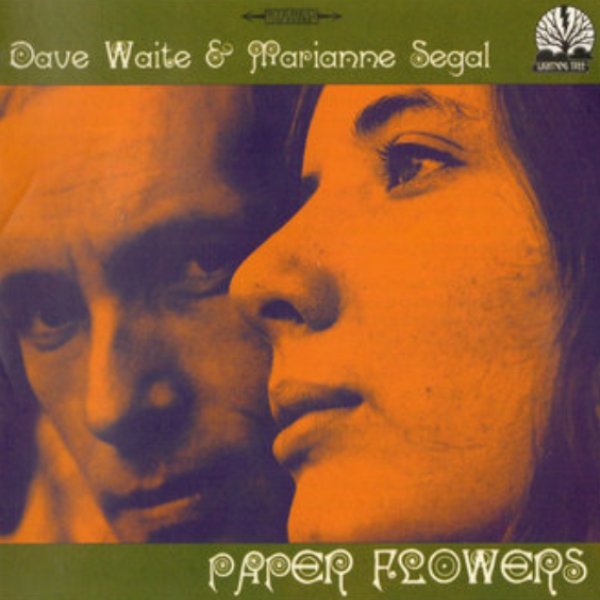Dave Waite & Marian Segal
DAVE WAITE AND MARIAN SEGAL – DUO 1967 – 1969
Dave Waite was born in Battersea in 1940 and grew up in the South London suburbs in a very musical family. By the mid-1950s. he was – in his own words – “a dedicated guitar freak” and listened to serious guitar players such as Laurindo Almieda (from Brazil), Segovia (a Spaniard), Tal Farlow, Johnny Smith (both Americans), Dave Goldberg, Johnny Smith and Judd Proctor (all English). By the late 1950s, Dave was in and out of various trios and duos until 1960 when he became part of The Countrymen who, whilst all but forgotten now, traded a clean cut, middle of the road folk-pop sound that was very popular with BBC variety audiences. They issued recordings on Pye and had both a TV and radio series.
In 1963, Dave was one of the founding members of The Barge Folk club in Kingston-Upon-Thames. On a cramped ex-coal barge, he was a witness to Sandy Denny’s first public performance. By 1967, The Countrymen had fallen apart after management wrangles so Dave was looking for something new and artistically fulfilling. Playing solo at universities and folk clubs he honed his style, plundering the catalogue of Phil Ochs, Tom Paxton, Joni Mitchell, Bob Dylan and other ‘60s greats.
A chance meeting in 1967 cemented the musical union that was to give birth to Jade. Dave spotted Marian performing at The Anglers pub in Teddington: “I was looking for something and so was she. We wanted to play the same material and best of all what I saw and heard that night with her oh-so English voice, counterpoised against a transatlantic guitar style, told me she was the other part of what I wanted to be doing”. From that moment on, Dave Waite and Marian Segal became a well-known duo on the UK folk scene playing any folk clubs that would have them.
By 1968, Marian was absorbing a more diverse assortment of US music. “I had been listening to sounds coming out of America: Tim Buckley, Seals and Crofts, Bob Dylan, Joan Baez, The Mamas and Papas, Buffy Sainte-Marie and the productions of Phil Spector and The Byrds. I was also into British artists such as Cat Stevens, David Bowie and the early Rolling Stones. These were my influences musically.”
Marian progressed to writing her own songs but she did not feel confident with them in a live environment until Dave began to encourage her. Six months into 1968, Marian finally felt confident enough to include her songs in the duo’s set list but despite her initial misgivings, the songs went down very well with the audiences who loved both Marian and her material. Dave recalls: “They loved Marian’s songs and the places she took them to, in just one line. I stood and saw how she made the connection between herself and the audience.”
By this time, the duo had attracted the attention of famed folk agent Sandy Glennon, who took them under his wing and booked them as stand-ins for Johnny Silvo and Alex Campbell, both of whom had a habit of dropping out on gigs. Eventually, and after much hard work, Dave and Marian established themselves on the circuit which enabled them to work at clubs all over the UK. The schedule included regular radio spots on shows such as Folk on Sunday with Jim Lloyd and appearances on regional television shows with artists such as The Settlers, Foggy Dew-O, Ian Matthews and the Strawberry Hill Boys (later The Strawbs).
In 1969, Sandy Glennon introduced them to record producer Jon Miller. Jon was in partnership with Dick James, an ex-pop star, erstwhile Beatles and Elton John publisher and then a powerful figure in the music industry. Jon had also worked as a booking agent and for The Spencer Davis Group’s management company, as well as for UK pop psych band ‘The Piccadilly Line’, before he hooked up with Dick James to form a publishing company, Jamil, that aimed to sign up new British acts. He invited Dave and Marian to record some demos and as a result, the duo signed to DJM for both publishing and recording.
Three tracks, ‘Paper Flowers’, ‘It’s Really Quite Alright’ and ‘I Can’t Love You More’, were produced in 1969 by Jon Miller for a possible single and whilst these employed Phil Dennys’ rich orchestration and the work of top sessions musicians such as Herbie Flowers and Barry Morgan, they were never released. Those 1969 recordings, similar in style to the early Strawbs, can be heard on the Paper Flowers album along with early demos, radio recordings and solo recordings by Marian. That record, first issued in 2004 by Lightning Tree Records, is included herewith.
Realising that times were changing and that the ‘60s pop folk sound had become dated, Jon Miller decided that Marian and Dave should move away from the lightweight American style folk sound and travel in a heavier, more progressive direction. He introduced Rod Edwards, one half of The Piccadilly Line (later Edwards Hand) and came up with the name Jade whilst also offering to manage the group.
Excerpts from: ‘No Sense of Time’ by Richard Allen June 2017
